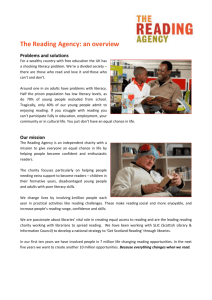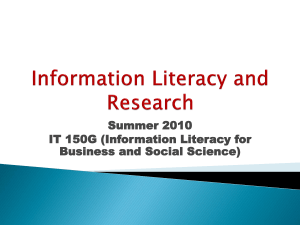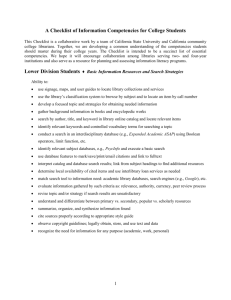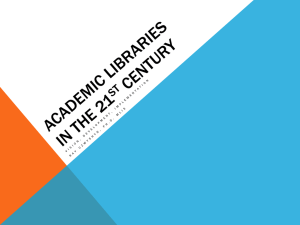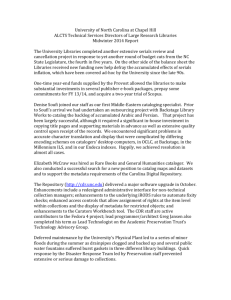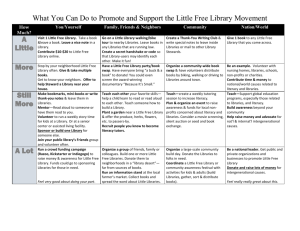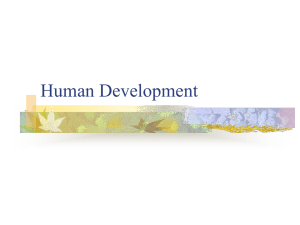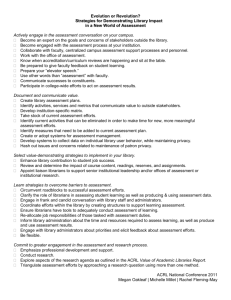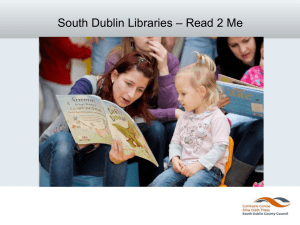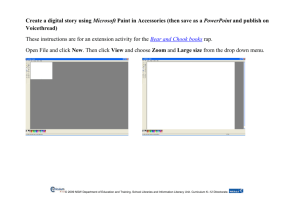Skills and Competencies of Library and Information Professionals in
advertisement
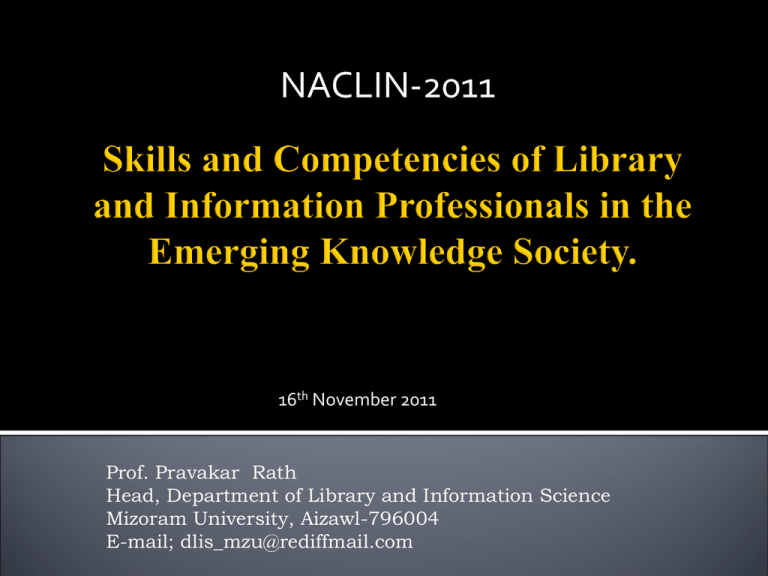
NACLIN-2011 16th November 2011 Prof. Pravakar Rath Head, Department of Library and Information Science Mizoram University, Aizawl-796004 E-mail; dlis_mzu@rediffmail.com Knowledge or brain power is more powerful than economic and military power, ICT- Major driving force behind, Libraries as gateways to knowledge, Automation, Networking and Consortia, Digital Library, Content development, Preservation and Management of Digital Resources, E-learning, Open Access and Open source, Information Literacy, Knowledge Management Institutional/Knowledge Repository, Library Professionals to Information/Knowledge Professionals Traditional Library to Digital Library Library Cooperation to Resource Sharing Networks/Consortia Collection Development to Content Development Conventional Learning to E-Learning Educational Literacy to Information Literacy Information Society to Knowledge Society National Knowledge Commission- “Libraries as Gateways to Knowledge” Libraries Today-Open Source, Open Access and Open Libraries, Information Resources-Collection and Organisation responding to users’ needs, Connection-Providing access whether local or remote on the web, Learner-focused-Responding to the information needs of the users, Networked-Linked to global resources and working with partners, Accessible-Easy to use, offering help and support, Dynamic-A Catalyst , inspiring and encouraging enjoyment and discovery, Current –Reflecting today’s communities in providing latest information. National Knowledge Commission (2007) while recommending the role of libraries as “gateways to knowledge” emphasized the skills required to fulfill the changing role of libraries as follows. Library and information handling skills Service orientation ICT knowledge skills Communication and training skills Marketing and presentation skills Understanding of cultural diversity Knowledge mapping skills. Technological Skills Working with sophisticated Technologies (Hardware and Software), Design and Development of new electronic services, Content Management (Content Creation, Content Delivery, Content Processing), Website and Intranet Management, Metadata Standards, Mark up Languages, Imaging Technologies, OCR, Information Literacy, Management Skills Preservation of print and e-resources, Leadership-innovative ideas and vision, Time Management, Crisis Management, Marketing of Library and Information Services, Customer oriented/ Value Added Services, Communication Skills The ability to exchange feelings, ideas and information with others in appropriate manner. Communication consists of the two key aspects of oral and written skills. Oral communication involves using the human voice to effectively articulate a message to an intended audience. Written communication involves using text or graphics to effectively transmit a message to an intended audience. Capacity building through skills and competencies of library and information professionals is a major challenge. The library and information professionals have to recognize and understand the broad context of the information environment, demonstrated by the ability to: understand and interpret the contexts in which information is originated, stored, organised, retrieved, disseminated and used; comprehend the legal and policy issues that are associated with, visualise future directions and prepare a roadmap to provide the most effective and efficient library and information services to the users in the 21st century. (i) Information seeking understand and investigate how information is effectively sought and utilised; identify and investigate information needs and information seeking behaviour of the users community. (ii) Information Infrastructure understand the importance of information architecture to determine the structure, design and flows of information; forecast, plan, facilitate and evaluate appropriate resource management to library and information services. (iii) Information Organisation enable information access and use through systematic and user-centred description, categorisation, storage, preservation and retrieval. (iv) Information Access provide and promote free and equitable access to information and client services; facilitate the acquisition, licensing or creation of information in a range of media and formats. (v) Information services, sources and products design and deliver customised information services and products; assess the value and effectiveness of library and information facilities, products and services; market library and information services; identify and evaluate information services, sources and products to determine their relevance to the information needs of users; use research skills to provide appropriate information to clients. (vi) Information literacy understand the need to develop information skills of the user community; facilitate the development of information literacy and the ability to critically evaluate information. Ethical, Legal and Social Responsibility Ethical and legal considerations arise in the storage, processing, retrieval and use of information and information systems. Further ethical and social responsibility relate to an awareness of the need for and commitment to the maintenance of high professional standards and social justice. Critical Thinking The ability to reach conclusions through reflection and evaluation by applying independent thought and informed the judgement. Problem-solving Skills The ability to find effective solutions to problems through creative reasoning. Ability to build partnerships and alliances (Public Private Partnership) Ability to develop knowledge infrastructure and knowledge resources with funding support and collaboration with outside organisations. Effective team relationship skills Team work is the ability to work effective with others in a group with the view to achieve the defined goals. The team leader makes a productive contribution to the collaborative efforts of the group by providing guidance to ensure desired goals are met. Self management skills Self management is the willingness and ability to develop a matured and balance understanding of self . Commitment to life-long learning The ability to learn how to learn in all facets of life ( professional , personal and educational) Knowledge Resource- Principle strategic resource of a nation, Developing Knowledge Infrastructure, Knowledge Professional- Need for multi-skills to meet the demand of the job market, Digital Library- Access adoption of formats and standards, content creation and management, copyright and IPR are the constant challenges for library and information professionals, Schools of Library and Information Studies to Revamp the Education and Training and Emphasis on Practical Application of ICT, Skills and competencies to be compatible with changing national and global job market. Thank You All

